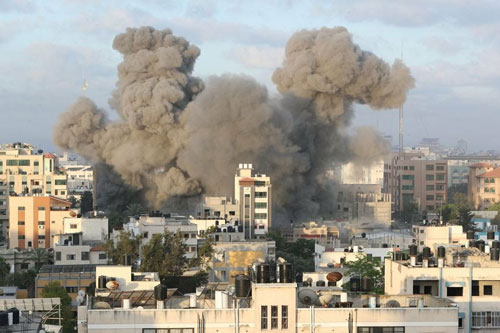Diplomatic efforts intensify
Gaza City
The UN Security Council was due to hold an emergency meeting on Tuesday amid a flurry of urgent diplomacy aimed at stemming Israel air strikes that have killed more than 200 Palestinians..
Despite growing calls for an end to the bombardment, Israeli Prime Minister Benjamin Netanyahu said late on Monday that Israel would “continue striking at the terrorist targets”.
Israel launched its air campaign on the Gaza Strip on May 10 after the enclave’s rulers, the Islamist group Hamas, fired rockets in response to Israeli police’s raid and shelling on Muslim worshippers in the Al Aqsa mosque and the threat of evicting Palestinians from an east Jerusalem neighbourhood.
In total, Israeli air strikes have killed 212 Palestinians, including 61 children, in Gaza — whilst rockets fired by Palestinian fighters have killed 10 people in Israel, including a child, according to officials on both sides.
The Security Council session scheduled for Tuesday is the fourth since the conflict escalated and was called after the United States, a key Israel ally, blocked adoption of a joint statement calling for a halt to the violence on Monday for the third time in a week.
US President Joe Biden, having resisted joining other world leaders and much of his own Democratic party in calling for an immediate end to the violence, told Netanyahu on Monday night he backs a ceasefire, but stopped short of demanding a truce.
Israel continued its barrage overnight, setting the night sky over the densely populated coastal enclave ablaze as multiple strikes crashed into buildings in Gaza City shortly after midnight, AFP journalists reported.
The Israeli army said on Tuesday it had struck 65 “targets” inside Gaza overnight, while Palestinian fighters had fired dozens of rockets, many of which were intercepted by air defences.
Late on Monday, Israeli strikes had knocked out Gaza’s only Covid-19 testing laboratory and damaged the office of the Qatari Red Crescent.
The rate of positive coronavirus tests in Gaza has been among the highest in the world, at 28 per cent. Hospitals in the poverty-stricken territory, which has been under Israeli blockade for almost 15 years, have been overwhelmed by patients.
Gaza resident Roba Abu al-Awf, 20, said she expected a rough night. “We have nothing to do but sit at home,” she said. “Death could come at any moment — the bombing is crazy and indiscriminate.”—AFP










